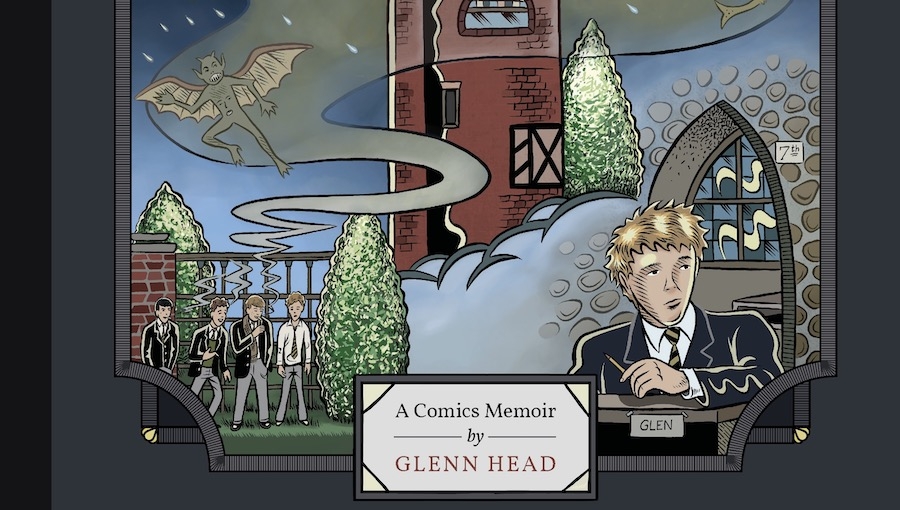The following is an interview with Glenn Head regarding the upcoming release of his graphic memoir, Chartwell Manor, from Fantagraphics. In this interview, Fanbase Press Editor-in-Chief Barbra Dillon chats with Head about his decision to share his own lived experiences through this book, his creative process in bringing the story to life, and more!
Barbra Dillon, Fanbase Press Editor-in-Chief: Next month will see the release of your graphic memoir, Chartwell Manor. What encouraged you to share this story with readers and to utilize your artwork to detail your own lived experiences?
Glenn Head: I felt this was a story I needed to tell, for obvious reasons. I was sent to Chartwell Manor as a 13-year-old boy, uprooted from my family. The school was all about “British Discipline,” getting kids in line. The place warped a lot of kids. It affected me, too. And some of my adult life has been spent coming to grips with my time there. Mine is a graphic novel/memoir about overcoming the adversity of abuse, its legacy, and what it takes to transcend it.
BD: In balancing the writing and illustrative duties of the project, what can you share with us about your creative process in bringing this personal narrative to life?
GH: The creative process of bringing it to life was a long one. I made various attempts over the years to turn my experiences at Chartwell Manor into a comic book story. The crucial thing was finding the right tone. The character of my abuser, the school’s headmaster, Terrence Michael Lynch for instance. Though he was in fact the closest thing to a demonic figure I’ve ever known in my life, and responsible a lot of damaged lives, he’s portrayed here as an absurd figure; lying, conning, swindling, assaulting, a comic book villain of sorts. But no joke. Nothing in the book is played laughs, and yet Chartwell Manor is intended as a darkly comic gothic horror tale. A true-life one meant to show the cost of abuse. How it follows us throughout our lives and as I say, that it’s possible to transcend it.

BD: The mental and emotional healing process for survivors of sexual abuse is often a long and challenging process; however, there is hope that healing is possible. For readers who pick up Chartwell Manor and may still be on their journey towards healing, is there anything that you would like to offer to provide them with the hope that healing is possible?
GH: The most important thing to know is that their experiences, whatever they may have been, no matter how horrible, are not the sum total of them as people. You are not defined by your experiences, they happened to you yes, you have to live with them, they follow you, but ultimately you define your experiences.
The book, Chartwell Manor, is the best example I can offer. If Lynch, my headmaster had been successful in defining me, I would be ruined, wrecked on alcohol, drugs, and other destructive behavior that followed in Chartwell’s wake. However, the opposite happened. I defined him, I defined the experience. What society, the powers that be, the patriarchy told me was too shameful, too disgraceful to be made public, well, I turned around and said, “Haha! No such luck, pal! You can’t stop me…. Here it is!”
Not that everyone needs to respond with that kind of vehemence. The point is, you don’t ask for the childhood you get, but you may have to suffer through it. That doesn’t mean you should go quietly. Ever.
BD: Given that this is such a deeply personal story, why did you choose Fantagraphics as the perfect home for Chartwell Manor?
GH: Fantagraphics has published every comic I’ve done for the last thirty years. They’ve always done right by me, and they were very enthusiastic about this book, believing in it, even as it was going into somewhat risky territory.
And, yes, this is deeply personal, but it’s also darkly comic, funny even, and I feel my work grows out of Underground Comics, which could be wild, transgressive, propulsive and scary. I’m not afraid of offending people and I don’t think Fantagraphics is, either!
BD: Are there any other projects on which you are working that you are able to share with our readers?
GH: Right now, I’m well into my third comics memoir, it’s working title is The Archetype, the basis of it is the friendship I had with British ex-pat hipster I knew in the 1980s on the lower east side of New York. Like a lot of Europeans, I knew back then he was here in America without documentation, working off the books. He worked in construction, and he died in a construction accident. He was just twenty one, and his death affected me profoundly. The story covers the ups and downs of the friendship, but in a way it’s just scaffolding for other things I want to explore brotherhood, what friendship means, family struggle, madness, and loss. It’s a much different book than Chartwell Manor where the events drive the narrative. In my next book, it’s the relationships that drive it. Structurally, it’s very organic, I believe.
BD: Lastly, what is the best way for our readers to find out more about Chartwell Manor and your other work?
GH: Well, they can go on my Instagram (@GlennHeadcomics), where they can see some of Chartwell Manor. They can also go to The Hollywood Reporter to read about the book or to the Fantagraphics website or Amazon to pre-order it.

